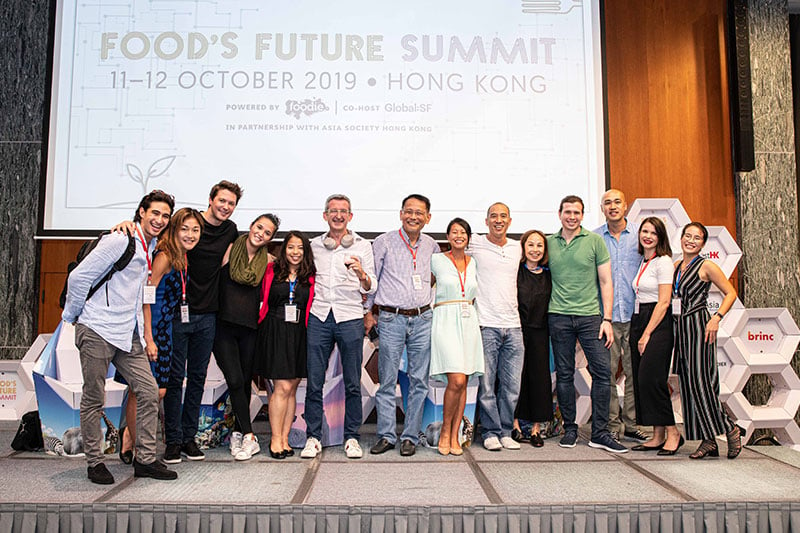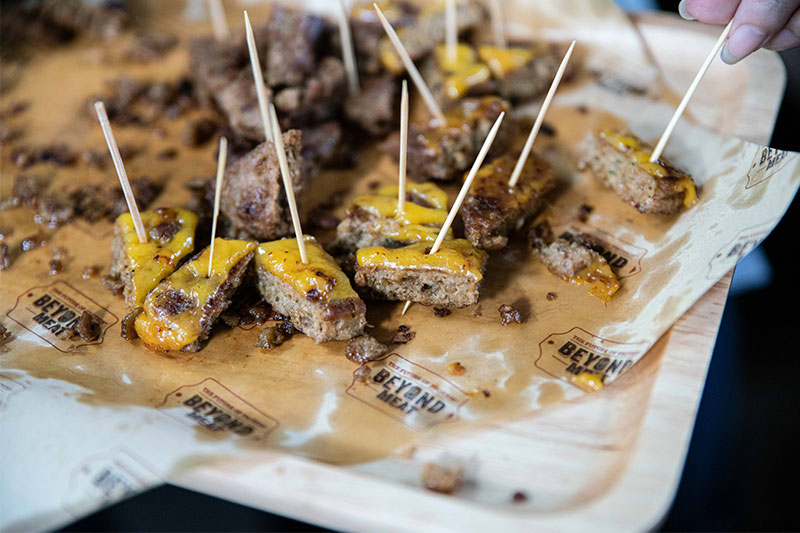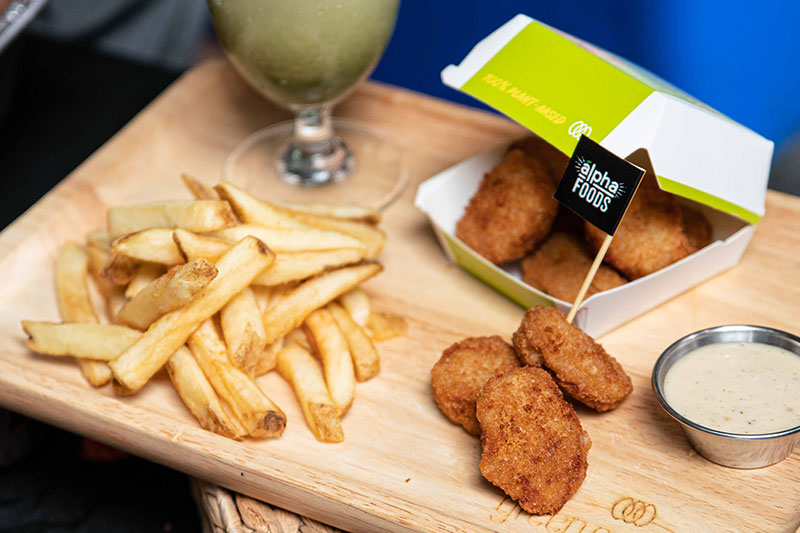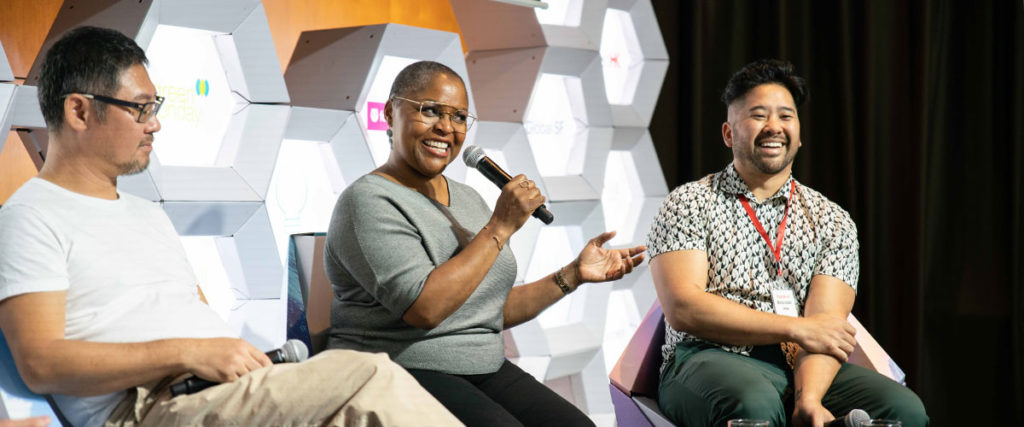From buzzwords like AI and blockchain to pressing environmental concerns, Hive Life gives you a rundown on the two-day Food’s Future Summit from last week just in case you missed out.
For the third year running, online food magazine group Foodie hosted the Food’s Future Summit at Hong Kong’s Asia Society. Hosting a diverse calibre of speakers from accelerators to chefs to tech entrepreneurs, all debating issues ranging from meat alternatives to blockchain solutions, the event brought everyone together to brainstorm solutions for how we as a generation can tackle food sustainability challenges one bite at a time. In the face of pressing environmental facts and figures, the conversation opened up many doors. As Manuel Gonzales, CEO of Global RIFF, a VC firm backing food tech, said, “The good thing about food is that it always grows. So, even when there is a downturn, it grows because we don’t stop eating. So it’s not only something that will impact everything we do; it will impact who we are, how we survive, how we live, but it’s also a very great investment.” Here are nine key takeaways from the summit.

#1
Blockchain could be used to make total traceability possible
There is no doubt that people care more and more about where their food comes from, but being able to deliver on total traceability is challenging for many food providers. “In Hong Kong, 90% of food is imported – 94% of fresh pork and 92% of vegetables. I think the house is really on fire when it comes to how we consume,” said Jon Gordon, Cross-Asset Strategist at UBS Wealth Management, to the audience. However, a way to make this farm-to-table process more transparent could be found in blockchain. Panelists explored the potential of implementing blockchain into the food chain so that consumers can place trust in the system by seeing exactly where their food comes from every step of the way. Greg Wong, Director of Analytics at CoE Platform & Technology of German software company SAP, gave an example by integrating this solution with a berry farm Naturipe. “So, technically, when you scan a QR code, you’ll know exactly where your berries are coming from.” As well as traceability, Benjamin So, Founder of 178 Degrees, announced that blockchain could make the whole issue easier to manage: “An equally compelling reason to implement some sort of traceability solution is purely for operational efficiency.”
#2
Innovative companies are looking to nature’s wealth for our better health
Heidi Spurell, CEO of Food Made Good HK, an organisation that works closely with restaurants to operate more sustainably, raised the point: “Did you know that there are 30,000 edible plant species, but we only eat between 150 and 200. 60% of our calories come from only four crops: rice, maize, wheat and potato. How limiting and unexciting!” Around the conference, however, food startups and scientists have been exploring alternative natural food sources to feed the world. For James Chang of Geb Impact Technology, marine life could hold the answer. “Microalgae is actually a treasure trove of resources. We can put it around biofuel. We can put it around bioplastics and muscle skincare.” Protein pioneers such as Avant Meats, Hong Kong’s first cell-cultured protein company, are looking to create alternative meat options such as cell-based fish maw. Other notable speakers included Calysta, a company which uses natural gas to create sustainable protein sources for animal feeds, Zhenmeat, the “Impossible Burger” of China, food developer HakkoBako building a smart fermentation chamber for chefs, and Alchemy Foodtech who has developed a low glycemic index grain and rice to tackle diabetes.
You might also like The Impossible Burger Hits the Shelves in the US. Will Asia be Next?
#3
Companies can now use AI to predict what we want to eat
AI algorithms can predict taste trends in the future. “Gastrograph AI is the first machine learning and artificial intelligence platform to model human sensory perception of flavour, aroma and texture to predict consumer preference. And it’s widely used to create new products,” says Ryan Ahn, Director of Research & Development at Gastrograph AI. And, the mystery flavour they predicted would be suitable for a sports drink for millenial Japanese women? Pine.
Similarly intriguing was Endless West, a molecular wine spirit brand that uses tech to produce novel flavours. CEO Alec described their process: “The basic thesis is that there are common molecules among all kinds of food and beverages that we eat. If we can source those molecules in a completely pure form, then we can use them like pixels of an image or pigments of a paint, and we then design them from the ground up.”

#4
A chef’s role is still front and centre in persuading customers to give new cuisines a try
“One of the problems that I’ve always faced when it comes to vegetarian food is people’s perceived idea of value for money,” said Shane Osborn, Michelin-starred Executive Chef and Owner of Hong Kong’s Arcane & Cornerstone and Semi-Finalist on Netflix’s The Final Table. “It’s changing that perception for people. Jerusalem artichoke is just as good as a piece of Wagyu in my view, and it’s our responsibility to highlight that and show people the possibilities. We just need to help convince people that this is the way to go.” And, sometimes, that way might be a little roundabout. “We do a lot in our projects around health by stealth,” said Heidi of Food Made Good. “You don’t let the consumer know they’re actually targeted. There are lots of little things that can be done around clever menu design and language. Give as much love to the way you describe green beans as you would to steak.”
#5
Food delivery platforms have brought in the age of the ‘Cloud Kitchen’
“The online food delivery market is forecasted to be a USD 230 billion market by 2030. That’s double-digit growth, year on year, while the traditional delivery market is negative 7% year on year,” said Chi Tran, CEO of Restart, a digital agency focusing on customer platforms and analytics. And, alongside that growth, the opportunity for independents to reach customers is growing too, illustrated Ilaria Chan, Group Advisor at Social Impact Investments of Grab. “A tech platform can allow a lot of mom-and-pop or SME shops to have the same visibility as a gigantic multinational like KFC, McDonald’s, or Jollibee because a platform is very fair.”
The customer reach provided by the delivery market via its various tech platform (Deliveroo, Grab, Foodpanda, etc.) has brought a new age in restaurant management – that of the Cloud Kitchen, a production unit for a takeaway facility that has no dine-in option which allows food concepts to optimise and strategise, thanks to data-driven operations systems drawn from customer choices. “We create virtual brands with no retail store or restaurant,” explained Chi. “The beauty of a Cloud Kitchen is that it’s flexible and, at the same time, we can actually utilise that data and experimentation to launch new things very quickly without the costs of brick and mortar. These kinds of outlets give us this opportunity to do things fast,” outlined Alex, the Head of Marketing from Foodpanda.
#6
Conscious consumers are growing in numbers, sophistication and demands
That a change is happening is undeniable. “According to a survey conducted by Green Monday last year, almost a quarter of Hong Kong’s population has become flexitarian,’ said Jimmy Chiang from InvestHK, the Government Department of Foreign Direct Investment. “What’s happening is really consumer-driven change,” Manuel of Global RIFF added. “You have a generation of people that have become very, very aware of their health and of the environment.”
The question on every consumer’s mind, however, is whether what’s good for the environment is good for them too. “In terms of plant-based meat, the question mark for a lot of people is on the health side,” said Jon from UBS. “In fact, we’re now offering alternatives that are actually worse for your health. This is going to create some sort of like backlash towards plant-based foods,” said Susan Evans, CEO of Melee and founder of HK’s Food Hackathon. And, in addition, individual needs are going to have to be met. “There’s no one-size-fits-all diet for everyone,” said Michelle Lau, Founder and Principal Dietitian of Nutrilicious, a B2B nutrition consultancy and communications company in HK. As Punam Chopra, CEO & Founder of Spice Box Organics, HK’s one-stop-shop for all organic pantry needs, put it, “As more knowledge comes out, [consumers] get more informed, educate themselves. They know their body more. They’ll figure out for themselves what works and what doesn’t.”

#7
Food waste solutions could forge a new, circular system
“In Hong Kong, the government is trying to reduce food waste from 3600 tonnes to about 2400 tonnes by 2022”, Heidi, CEO of Food Made Good, stated. And, in this, Jon from UBS sees huge potential. “I think food waste is a massive opportunity. In fact, I think it’s probably a bigger opportunity than inventing new foods.” One solution could be found in a circular approach, according to Daniel Jongejan, APAC Project Director of PUR Projet, a company that aims to empower local communities while strengthening supply chains. “I think if your supply chain is in China, the composting programme at some point needs to feedback to that supply chain too.” Another way is using food waste for the benefit of others: “We actually started to talk with some hotels in Bangkok about collecting their food waste, and we’d then bring it to farmers. Because, for them, it’s basically free composting. We cannot just rely on one hotel to resolve their food waste. We have to target the entire environment, the entire ecosystem,” Daniel adds.
#8
Tech alone cannot save the day
There was a broad consensus at the summit for the need to transform the whole food system, rather than targeting isolated segments of the supply chain. Many of the panelists also brought up the ramifications of tech in the food space – who does it actually benefit in the end?
“So what happens with the farmers? Is that wealth now going to the corporations that are going to control [the technology] now? And what happens to the families and communities that were involved,” asks Manuel of Global RIFF. At PUR Project, they believe in the need to change things from the ground up. “We actually believe if we want to target the kinds of problems of today, we have to start with the farming communities. We call this process insetting. Farmers often cannot pay for the resources they are seeking. They don’t get the proper training. So, when we do our projects, we provide them with these elements,” explains Daniel from PUR Project.
The key is communication. “In Hong Kong, without a system in effect, without the different departments talking to each other about how the flow of food can happen, it’s very difficult to move to this next stage,” said Susan from Melee Limited. “You can do one thing, but if it’s not connected to something else, then there is no flow.”
#9
Asia is a great place to try something new
With Asia already home to a variety of cuisines, it is a prime spot for growth in the food arena. “Asia is a very attractive playground for these new concepts, not simply because of the fact that 60% of the food produced in the world is consumed right here. You also have an ecosystem, ripe with talent, and the opportunity for scale because of your proximity to China,” said Natasha D’Souza, seasoned business journalist and host of the event. “In some ways, Hong Kong is really a microcosm of this broader trend towards urbanisation, of more consumption and wealthier groups that are consuming at a larger scale. That’s really where we’re heading in the world,” observes Jon from UBS.
“I think it’s a need of our times, of course, to make sure that our dialogue is as cross-continental and borderless as possible because so much of our challenges, even here in Asia, may have solutions from another part of the world,” said Natasha as she rounded up the summit. Larry Tang of FAMA Group adds, “Food is our problem as well as our pollution right now, but it can also be our solution.”
Related Articles
Hong Kong’s Vegan Queen on Her Latest Foodie Venture
12NOON: The Fast Food Spot That’s Good for You and Your Wallet
Meet The Brains Behind Asia’s Snacking Phenomenon The Golden Duck





